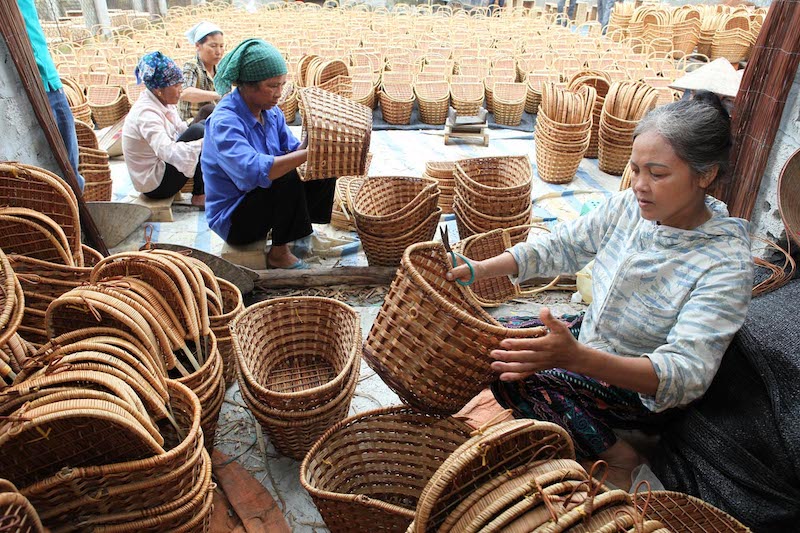Hanoi to digitize 300 traditional handicrafts by 2030
The city aims to restore and preserve at least five endangered traditional crafts between 2025 and 2030.
Hanoi plans to digitize 300 traditional handicrafts with social resources and government support, through initiatives such as the creation of a vlog called "Hanoi Craft Villages" and an electronic manual to preserve cultural values from 2025 to 2030.
| Hand-woven bamboo products for export at Phu Tuc Craft Village. Photo: Tran Viet/ The Hanoi Times |
The move is part of a comprehensive project to develop craft villages in Hanoi from 2025 to 2030, with a vision to 2050, approved by the municipal People's Committee on January 15.
It focuses on preserving traditional cultural values while encouraging the development of new craft villages. Craft villages will be reviewed and classified for preservation or transition to other trades, with tourism, culture and festivals planned to enhance production and economic restructuring while traditional handicrafts will be promoted.
From 2025 to 2030, the city aims to restore and preserve at least five traditional crafts facing extinction, seek recognition for at least ten new crafts and 25 traditional craft villages, and upgrade ten villages from "craft village" to "traditional craft village".
It also plans to develop tourism in at least three craft villages and establish ten craft village experience tours. The goal is for more than 80% of the traditional craft villages to operate effectively, with at least 80% of the workers receiving training to hone their skills, workplace safety, and basic IT know-how.
Hanoi aims to have more than 50% of traditional craft villages certify their products under the One Commune One Product (OCOP) program, while supporting their digitization. In addition, intellectual property rights are expected to be protected in at least 30% of recognized craft villages.
The city aims to achieve an average annual increase of 10% in the production value of all artisan villages and commits to 100% compliance with environmental protection standards set by current legislation for all recognized villages. It aims to ensure that at least 30% of the artisan villages have dedicated spaces for product display and sales, either physically or through e-commerce platforms.
By 2050, over 80% of traditional artisan villages aim to operate efficiently, with 90% of workers receiving training in skills, safety and basic IT.
The plan targets 300 artisan villages with OCOP-certified products, ensuring that 50% have intellectual property protection and dedicated display or online sales space.
The average production value of these villages is projected to increase by nearly 10% per year, while maintaining full compliance with environmental protection regulations. The city also aims to develop value chains for trades that involve multiple villages and intensive use of labor.












